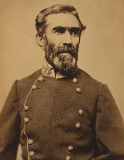
General Braxton Bragg
Courtesy of the Library of Congress
Getting his army back to the safety of Dalton, Georgia, after the disastrous defeat at Missionary Ridge, General Braxton Bragg submitted his resignation as commander of the Army of Tennessee on December 2, 1863, in what has generally been portrayed as being happily received by the soldiers of his army.
Sam Watkins famously noted in his memoir, Company AYTCH, "He was never popular with his troops...", but is that really true? Artilleryman Luthor Wyman of Semple's Alabama Battery noted, "Gen. Hardee is at present in command of the army, he is not liked at all by the men. Reports are that Gen. Johnston will take command in a few days with Gen. Bragg as his adjutant general. He will do. A large portion of the army was very sorry to part with Bragg..." and Colonel Bolling Hall Jr. wrote his father, “All blame Hardee with it that I have seen. Everybody says Bragg is not at all to blame. You would be, I can almost say, astounded were you to go into the army to see what a calamity all without exception regard the removal of Bragg. I have talked to many from different commands & the confidence is universal in him. Of course I do not refer to general officers. I talked to none of them about it. Col. Sawyer [ED: of the 24th Alabama Infantry] told me he always knew that Bragg was popular with a majority but he has been astonished to find how strong & universal the feeling is for Bragg and how great the confidence in him." Furthermore, B.J. Semmes of the 154th Tennessee wrote his family, “General Bragg has been retired at his own request; they say he certainly was not to blame for this defeat. He acted splendidly on the day of the battle, and tried to rally the flying cowards in vain, and even ordered our old brigade of Tennessee to fire upon them, which they did. I tell you, no matter what the papers say, or what anybody tells you General Bragg has the entire confidence of the Army and they are almost unanimous in deploring his loss and will hail his return with acclamation. I do not know where he is to go, or what command is given him, and should not be surprised if he were ordered back in a month….”
Other men also expressed the same views at the time, and about two months later, General William Bate wrote Bragg," I thought at the time and think now you erred in asking to be relieved from command.” So, the views on Bragg were not as clear cut as Watkins would have us believe. To be sure, there were men who disliked him, but you cannot say it was unanimous or that even a majority felt that way toward Bragg. History is rarely crystal clear and that is certainly the case with the popularity of Braxton Bragg.
